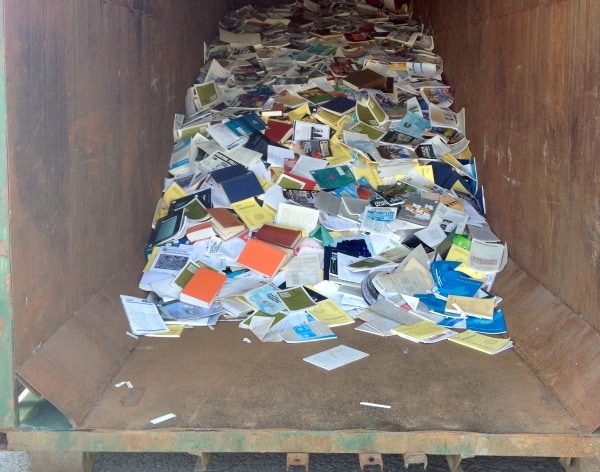Feds Accelerate Closure of Research Libraries


Reports are emerging that seven out of nine Department of Fisheries and Oceans libraries are either slated for closure or are in the process of being closed, including collections with Winnipeg’s Freshwater Institute, the St. Andrews Biological Station in New Brunswick (where Rachel Carson conducted research while writing her book “Silent Spring”) and the Northwest Atlantic Fisheries Centre in St. John’s.
A collection of 61,000 French-language documents on the history of Quebec’s waterways from the Maurice-Lamontagne Institute has apparently ended up in a dumpster.
The library closures are among the many being undertaken across several other departments, including Foreign Affairs, Environment Canada, Canadian Heritage, and Citizenship and Immigration.
A “verbatim text from a DFO scientist” claims, “The cuts were carried out in great haste apparently in order to meet some unknown agenda. No records have been provided with regard to what material has been dumped or the value of this public property. No formal attempt was made to transfer material to libraries of existing academic institutions.”
The unnamed government scientist goes on to say, “The Department has claimed that all useful information from the closed libraries is available in digital form. This is simply not true. Much of the material is lost forever.”
Even if it were true that original documents existed safely in digital form, it is a huge mistake to destroy original materials just because they can be accessed online. Digital copies of real things are not the things themselves. They are only a handy method of accessing those objects remotely. They cannot be studied in real life and no one can now say what data has been lost along with the thing itself.
The trouble with confirming any of these reports is that the “half a dozen prominent scientists” who have leaked information to a single reporter at online publication The Tyee are speaking off-record out of fear that their funding could be cut off if or when the government traces the leak back to them. Hearing what they have to say would not be a problem had the government not forbidden its scientists to speak unvetted with the media.
Recent attempts at closure of research facilities have included Ontario’s Experimental Lakes Area and the Centre for Offshore Oil, Gas and Energy Research. The government’s Deficit Reduction Action Plan (DRAP) regarding the DFO can be seen here.
The cuts relating to the closure of these libraries, according to the DRAP document, will save the taxpayer $443 million per year. The document goes to the trouble of indicating which actions are “high profile”, noting that the plan to close Ontario’s Experimental Lakes Area has been “the subject of intense media attention and a letter writing campaign”.
As exciting as recent developments in the wider world of technology are, both within the private sector and through government initiatives like the Canadian Light Source, one can’t help but wonder how much better things could be if the current administration weren’t so demonstrably and tenaciously opposed to science- or fact-based methods of developing policy or encouraging the growth of Canada’s tech sector.
Cutting costs is one thing. Destroying infrastructure is another. It takes very little time to get rid of infrastructure and resources that cost the taxpayer money. And it takes a generation or two of costly rebuilding to replace a resource after the realization that the loss ends up costing more than said resource’s continued existence and maintenance.
The government can claim that the closures are merely cost-saving measures and absolutely unrelated to the perceived hostility it has to any science or information that might undermine its oil-and-gas priorities. And such a claim might be convincing if the government had not already established a record of developing policy that is so clearly led by ideology, rather than by science or facts, in other areas such as its “tough on crime” legislation or its punitive approach to treating drug addiction.
With the closure of these facilities, the public will simply never know whether such claims are true or false.
_______

Terry Dawes
Writer
